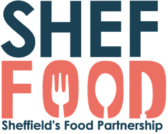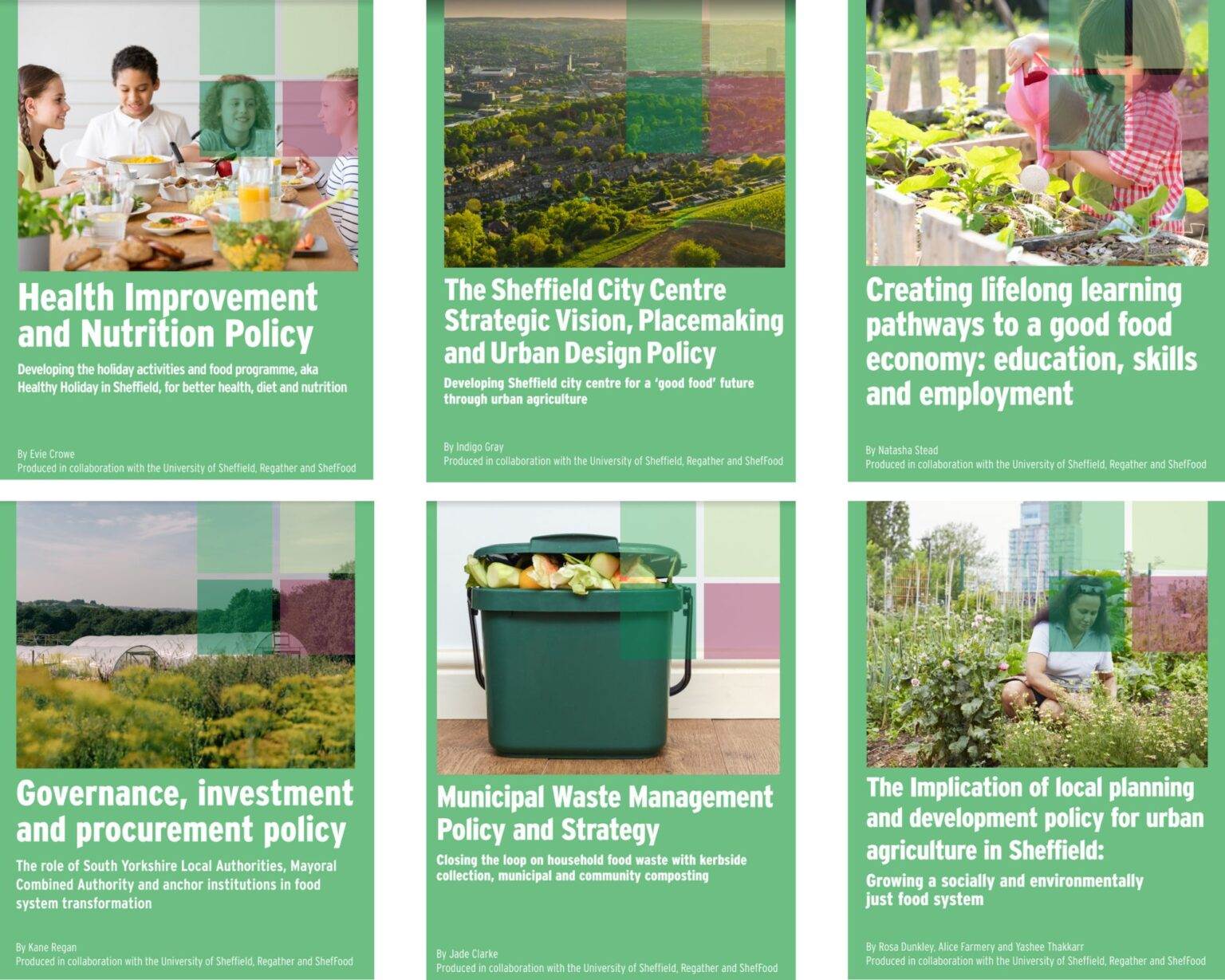The Institute for Sustainable Food at The University of Sheffield, in partnership with Regather Farm, tasked Sheffield students with research on a wide range of topics connected with local food systems. These reports are a valuable resource for local organisations working in the food sector, including ShefFood and partners. These students have delivered some fantastic research which we can now put into action.
Highlighting our Successes & Driving Change
The six final reports were authored by Jade Clarke, Evie Crowe, Rosa Dunkley, Alice Farmery, Indigo Gray, Kane Regan, Natasha Stead, and Yashee Thakkarr and edited by Alice Farmery. They look at six key areas in food strategy, from health to urban planning. To make the food system in Sheffield work for all, there has always been a need for a holistic approach. No one area can solve all problems, so bringing together these many strands of our city together can help our policymakers create beneficial change in the long term, not just in the short term. These reports not only highlight what needs to change but each showcases some of the successes of our region when we put food, health and the planet first.
Better Health for Our Kids
Report: Health Improvement and Nutrition Policy
This report looks at how developing holiday activities and food programmes can improve our children’s health, diet and nutrition. In fact, the Sheffield Holiday Activities and Food (HAF) scheme saw 11,400 children attend a HAF activity in the Summer of 2022. To extend this further, the report suggests increasing education on nutrition and sustainable food and developing food-growing activities for children. Connecting and forming partnerships with more socially-minded local businesses is key in developing these gaps within the programme and increasing ethical and green investment in the city.
Making the City Centre Work
Report: The Sheffield City Centre Strategic Vision, Placemaking and Urban Design Policy
This research focused on how urban planners could use our thriving and growing local food scene to support the environment, the economy and local people. Heavy investment in recent years in areas such as Leopold Square, The Moor, and St Paul’s Place has created a variety of food retail and hospitality businesses. But, critics say the constant redevelopment of the area alongside the social shifts brought about by the pandemic has resulted in a loss of a sense of identity and purpose for the city centre. One key objective the report highlights to change this outlook is the development of urban agriculture in Sheffield’s city centre. Strong evidence suggests that Inner city food-growing offers a potential opportunity to stem urban decline and reinvigorate our city centre.
Training the Next Generation of Farmers
Report: Creating Lifelong Learning Pathways to a Good Food Economy
We cannot grow our food economy if we don’t have the right training and education in place. This report highlighted how having the means in place for farmers to set up their own businesses and be successful in doing so can ensure lifelong wealth for workers and the wider community. Access to land, training and financial support are some of the key challenges we need to tackle. However, with an ever-growing urban farming landscape, we can already see the potential from the recent successes of organisations such as Regather and Moss Valley Market Garden.
Holding Government Accountable
Report: Governance, Investment and Procurement Policy
This report outlined a series of policy recommendations through which key organisations can lead the region towards food system reform. Local Authorities, the Mayoral Combined Authorities and Anchor Institutions such as Universities hold power to be leading examples in the communities for which they are responsible. By emphasising the evidence that shows the negative effects of our current food system and discussing how local food systems encourage regenerative and valuable transformation, this report highlights there is a better way.
Saying No to Food Waste
Report: Municipal Waste Management Policy and Strategy
Food waste is a big issue in the UK, including here in Sheffield. This report looked at the current waste system and how a more radical approach could make a massive difference to our impact on the planet and our ability to feed our communities. We already have some fantastic organisations in the city using up surplus food, such as Food Works and the Sheffield Food Bank Network. But, ensuring a closed-loop system where composting is the default for all food waste can help us reduce emissions, regenerate our soil, improve crop health, increase biodiversity and create healthier, tastier fresh food for the people of Sheffield.
Growing More Food in Sheffield
Report: The Implication of Local Planning and Development Policy for Urban Agriculture in Sheffield
The final report used an in-depth study of an already thriving urban agricultural area in Sheffield. The Moss Valley Cluster, a 10km2 area in the South of Sheffield with several small farms and a rich biodiversity, is a fantastic showcase of what we could do with land in Sheffield. This growing community of farmers and wildlife enthusiasts has employed hundreds of people and brought food production back into the city. But, the report also highlights the challenges further developments like this face. From increasing land access and horticultural training to making green prescribing and community wealth building at the centre of our neighbourhoods, there are many barriers to change. However, this report shows what needs to be done and how we can do it.
What’s Next for Sheffield Food
These reports have already helped local authorities and Sheffield organisations develop policies and start putting them into action. Last month, ShefFood launched the Sheffield Local Food Action Plan, which saw almost 100 organisations commit to taking 73 concrete actions across the city. Many of these actions have been informed by the incredible work of these reports.
All reports can be found on the Regather blog as well as ShefFood’s Key Strategic and Research Documents page.

